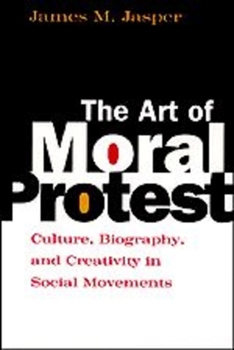The Art of Moral Protest: Culture, Biography, and Creativity in Social Movements
Select Format
Select Condition 
Book Overview
In The Art of Moral Protest, James Jasper integrates diverse examples of protest--from nineteenth-century boycotts to recent movements--into a distinctive new understanding of how social movements work. Jasper highlights their creativity, not only in forging new morals but in adopting courses of action and inventing organizational forms. "A provocative perspective on the cultural implications of political and social protest."--Library...
Format:Paperback
Language:English
ISBN:0226394816
ISBN13:9780226394817
Release Date:September 1999
Publisher:University of Chicago Press
Length:530 Pages
Weight:1.65 lbs.
Dimensions:1.2" x 6.1" x 9.1"
Customer Reviews
4 ratings
Still the best book on social movements
Published by Thriftbooks.com User , 18 years ago
I use this book every year in my social movement class at the University of Texas at Austin. It provides an excellent overview of the social movement literature through the mid-1990s. More importantly, it provides a pathbreaking theoretical approach to social protest with rich empirical evidence. My students are also very high on the book. It is a must read for all students of social movements.
Will be considered a classic by future generation
Published by Thriftbooks.com User , 21 years ago
James Jasper offers one of the best books available on social movements. In "The Art of Moral Protest" it is mostly the cultural and emotional sides of social movements which is explored leaving aside the more traditional structural accounts of social movement theory. Jasper emphasize principally 4 dimensions of protest: culture, resources, strategies and biographies and divide movements into two categories: citizenship movements and post-citizenship movements. Interestingly however, the structure of the book do not follow these main dimensions and categories but propose a kind of linear logic of movements' evolution from the emotion (moral shock) which send people into action to the creation of a movement culture which help sustain participation to the relation between movements and the broader culture in which they evolve and try to change. An interesting last part deal with the author's own "normative view" of social movements exploring the pleasures associated with movement participation, the danger sometimes embodied in social movement (particularly those who harbour totalizing ideologies) but also the necessity of protest for our societies. The book is full of stories and historical details which help make sense of the arguments developed in the book and keep this theoretical book as interesting as a novel.If I had to teach a course on social movements, I would probably chose two books for my students to read. The first one would be "Power in Movement" from Tarrow and the second one would be "The Art of Moral Protest". Many excellent books have been written on social movements but very few complement each other as well as these two books. They present the two current main branches of social movement studies.If I had to find a few problems with the book it would be related to the reference system adopted. By placing all references and notes at the end of the book, the more interested reader easily get lost. It might sound silly at first, but since the book is quite thick it becomes quite annoying with time... especially when you are thrilled by the reading but still want to get that extra detail hidden at the end of the book.
The best recent book on social movements!
Published by Thriftbooks.com User , 22 years ago
I loved this book. Anyone who likes the cultural side of politics will appreciate this book, Jasper's magnum opus. If you're writing a dissertation on social movements, you can't not read it.
A Pathbreaking Book
Published by Thriftbooks.com User , 23 years ago
James Jasper's "The Art of Moral Protest" is one of the most important recent contributions to the scholarly literature on social movements and political and moral protest. The book's title signifies two important ideas. First, Jasper wants to restore the moral dimension to political protest, which of late has been reduced by many scholars to the calculated pursuit of material interests. Second, the book stresses the "artful" nature of protest, the fact, that is, that protest doesn't simply arise in some mechanical fashion from "structural" preconditions, but involves choices and improvisation by thinking (and feeling) individuals. Indeed, Jasper wants to reintegrate feelings and emotions, which scholars have studiously avoided in recent years, back into our understanding of moral protest. And he emphasizes how specific individuals with specific biographies (who, again, have been largely purged from the scholarly literature) matter for protest. The book weaves a powerful critique of dominant ways of thinking about protest through a series of fascinating studies of several movements and movement participants. In sum, this is an extremely important and pathbreaking book. It should be read by anyone with an interest in politics, social movements, or protest.




